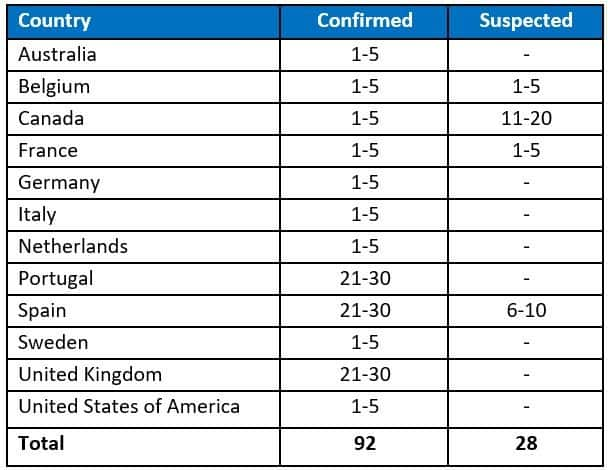Monkeypox cases to rise globally, warns WHO as disease spreads to 12 countries
"The situation is evolving and WHO expects there will be more cases of monkeypox identified as surveillance expands in non-endemic countries," the global health body said.
- The WHO on Saturday warned that there will be more cases of monkeypox.
- The UN agency said that the new cases have no established travel links to endemic areas.
- It stated that cases have mainly been identified amongst men who have sex with men.
Trending Photos
) REPRESENTATIONAL IMAGE (CREDITS: IANS)
REPRESENTATIONAL IMAGE (CREDITS: IANS) New Delhi: The World Health Organization (WHO) on Saturday (May 21, 2022) warned that there will be more cases of monkeypox as it expands surveillance in countries where the disease is not typically found. It added that it will provide further guidance and recommendations in the coming days for countries on how to mitigate the spread of monkeypox.
"The situation is evolving and WHO expects there will be more cases of monkeypox identified as surveillance expands in non-endemic countries," the global health body said.
"Epidemiological investigations are ongoing, however, reported cases thus far have no established travel links to endemic areas. Based on currently available information, cases have mainly but not exclusively been identified amongst men who have sex with men (MSM) seeking care in primary care and sexual health clinics," it added.
The identification of confirmed and suspected cases of monkeypox with no direct travel links to an endemic area represents a "highly unusual event", the WHO said.
While the first European case was confirmed on May 7 in an individual who returned to England from Nigeria, the UN agency said that there are so far 92 confirmed cases and 28 suspected cases of monkeypox that have been reported from 12 member states that are not endemic to the virus.


The WHO also said that the currently available evidence suggests that those who are most at risk are those who have had close physical contact with someone with monkeypox, while they are symptomatic.
Can monkeypox outbreak turn into a pandemic like Covid-19?
Scientists feel that the monkeypox outbreak will not evolve into a pandemic like Covid-19 as this virus does not spread as easily as SARS-COV-2.
Fabian Leendertz, a researcher at the Robert Koch Institute in Germany, described the outbreak as an epidemic.
"However, it is very unlikely that this epidemic will last long. The cases can be well isolated via contact tracing and there are also drugs and effective vaccines that can be used if necessary," he was quoted as saying by Reuters.
ALSO READ | Keep a close watch on situation: India directs officials as Monkeypox cases rise
A senior US administration official said that there appears to be "a low risk" to the general public at this time.
The outbreaks, however, are raising alarm because the viral disease mostly occurs in the west and central Africa, and only very occasionally spreads elsewhere.
"Historically, there have been very few cases exported. It has only happened eight times in the past before this year," said Jimmy Whitworth, a professor of international public health at the London School of Hygiene and Tropical Medicine, who said it was "highly unusual".
Still, the World Health Organization's European chief said that he was concerned that infections could accelerate in the region as people gather for parties and festivals over the summer months.
According to the WHO, there is no specific vaccine for monkeypox, but data shows that the vaccines used to eradicate smallpox are up to 85% effective against monkeypox.
Why are monkeypox cases rising?
One possible scenario behind the rise in cases is increased travel as Covid-19 restrictions are lifted.
"My working theory would be that there`s a lot of it about in west and central Africa, travel has resumed, and that`s why we are seeing more cases," said Whitworth.
She stated that urgent investigation of the new cases was important as "they could suggest a novel means of spread or a change in the virus, but this is all to be determined".
"This isn`t going to cause a nationwide epidemic as Covid-19 did, but it`s a serious outbreak of a serious disease – and we should take it seriously," said Whitworth.
What is monkeypox disease?
Monkeypox is a rare viral infection similar to human smallpox and was first discovered in 1958 in monkeys kept for research. The first human case of monkeypox was recorded in 1970. The disease occurs primarily in tropical rainforest areas of Central and West Africa and is occasionally exported to other regions.
The virus belongs to the family Poxviridae, which also includes the viruses causing smallpox and cowpox disease.
What are monkeypox symptoms?
Monkeypox typically presents itself with fever, rash, and swollen lymph nodes and may lead to a range of medical complications. The disease is usually self-limiting with the symptoms lasting from two to four weeks. Severe cases can also occur. In recent times, the case fatality ratio has reportedly been around 3-6 per cent but can be up to 10 per cent. There are no reported deaths in this current spread.
How does monkeypox spread?
Monkeypox is transmitted to humans through close contact with an infected person or animal, or with material contaminated with the virus. It is said to be spread by rodents such as rats, mice and squirrels.
The disease is transmitted through lesions, body fluids, respiratory droplets, and contaminated materials such as bedding. The virus is less contagious than smallpox and causes less severe illness.
Health officials, however, have also noted that some of these infections may be transmitted through sexual contact. The WHO said it was also investigating many cases being of people identifying as gay or bisexual.
The WHO said the early cases were unusual for three reasons: All but one have no relevant travel history to areas where monkeypox is endemic; most are being detected through sexual health services and among men who have sex with men, and the wide geographic spread across Europe and beyond suggests that transmission may have been going on for some time.
How is monkeypox treated?
Vaccines used during the smallpox eradication programme also provided protection against monkeypox. Newer vaccines have been developed of which one has been approved for prevention of the disease. An antiviral agent developed for the treatment of smallpox has also been licensed for the treatment of monkeypox, according to WHO.
(With agency inputs)
Stay informed on all the latest news, real-time breaking news updates, and follow all the important headlines in india news and world News on Zee News.
Live Tv







)
)
)
)
)
)
)
)
)
)
